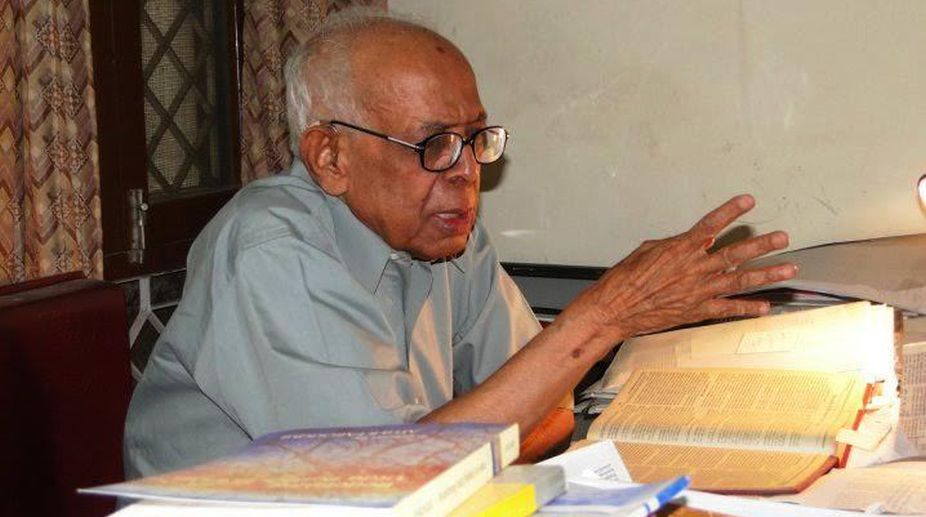Security beefed up in Ayodhya ahead of 31st anniversary of Babri Masjid demolition today
Admin the anniversary of the demolition of the Babri Masjid, the local administration has tightened security in Uttar Pradesh's Ayodhya.

Shahabuddin (Photo: Twitter)
Former Indian Foreign Service (IFS) officer, MP, editor of “Muslim India” and a trusted friend, Syed Shahabuddin, who was suffering from prolonged illness, died at a hospital in Noida, last Saturday. He was 82.
To the author, Shahabuddin was an astute editor and a mentor when it came to writing on the problems facing Indian Muslims in his fortnightly magazine, “Muslim India” in the 1990s. The author, who contributed regularly to the magazine, feels that no other document except the “Milli Gazette” profiled the community’s issues as “Muslim India” did.
It was under Shahabuddin’s leadership in December 1986 that Babri Masjid activists from Delhi, UP and elsewhere held the All India Babri Masjid Conference and formed a 10-member Babri Masjid Movement Coordination Committee (BMMCC), with him as its convener. The conference adopted the Declaration of Delhi and decided to call upon Muslims not to associate themselves with the official celebration of Republic Day, 1987, to hold a mass rally on Rajpath in Delhi in March 1987 and, if those two steps failed, to hold a mass Friday prayer in Babri Masjid in October 1987.
This woke up the political parties and the government. There was wide support for the Muslim demand for expeditious judicial settlement but the national press vitiated the atmosphere by accusing the Muslims of “boycotting” the Republic Day and planning a March to Ayodhya.” The unprecedented rally in Delhi, with more than half a million people present, made history.
Advertisement
Though a frontline leader of the Babri Masjid Movement Coordination Committee (BMMCC), he developed sharp differences with the Shahi Imam, Syed Abdullah Bukhari and others on taking the movement from a path of sensible protest to that of acquiring communalist overtones. This was witnessed in the India Gate protest where all the leaders including Shahabuddin gathered on a stage.
Since negotiations were going on with the government, the proposed Friday prayer at Ayodhya was deferred by BMMCC. This divided it and five members, including Imam Abdullah Bukhari, Azam Khan and Zafaryab Jilani resigned to form the All India Babri Masjid Movement Action Committee (AIBMAC) in October 1988. However, the two committees continued to cooperate, particularly on the legal front.
On 16 November 2012 Shahabuddin published an open letter to Narendra Modi regarding Muslim voters, amongst other things. He was also criticised for that. Shahabuddin founded the Insaf Party in 1989 (dissolved in 1990 and later revived). He was known for his strong belief in the federal structure of India and his desire to see more people participating at every level of governance. He had often called for persistent action against corruption, nepotism and inefficiency, for democracy within political parties and for equitable distribution of national income and resources in order to provide a life of minimum dignity to all people.
Shahabuddin edited the research monthly journal Muslim India between 1983 and 2002 and again from July 2006. He was a regular contributor to TV discussions on current affairs. He had written many articles for the Saudi Arabian newspaper, “Arab News”. He was known for a ban on “The Satanic Verses”– Salman Rushdie’s book that sparked angry protests.
According to Navaid Hamid, who heads the All India Muslim Majlis-e-Mushawarat, the body once headed by Shahabuddin, few Indian leaders have been of his calibre and political acumen in the history of Indian Muslim leadership.
Born in 1935 in Ranchi, now in Jharkhand, he joined the IFS in 1958 but took premature retirement in the 1970s to delve into politics.
As a diplomat, he lobbied for the creation of Bangladesh and rallied support in Latin America — where he was posted at that time – for Indian intervention in the affair. Although considered to be in the good books of then Prime Minister Indira Gandhi, he was one of the few diplomats who were openly anti-Emergency.
Within eight months of relinquishing service, Shahabuddin was elected to the Lok Sabha in 1979 from Kishanganj in Bihar, a Muslim majority constituency that sent him to Lok Sabha multiple times but remained neglected by him as far as development is considered.
Shahabuddin shot to further prominence during the Ramjanmabhoomi movement as he remained at the forefront of the movement from the Muslim side.
Although seen by many as a fundamentalist hawk thanks to his tough stance on Babri Masjid and Shah Bano issues, Shahabuddin was a practitioner of left-of-centre politics and proudly called himself a socialist.
The writer is a social commentator and can be contacted at firozbakhtahmed08@gmail.com
Advertisement